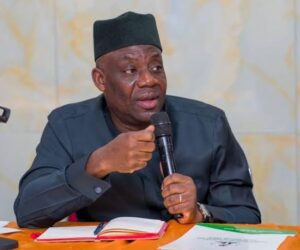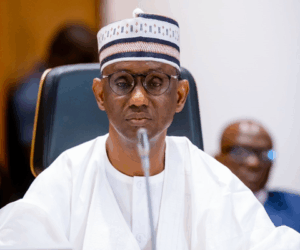Convener of The Paul Alaje Colloquium (TPA), Dr. Paul Alaje, has said the high rate of poverty in Nigeria and indeed Africa is due to under-utilisation of natural resources.
In a stirring address at the TPA Colloquium 2025, Saturday in Abuja, Dr. Alaje urged the continent to confront its systemic challenges that prevent potential from translating into prosperity and harness its vast potential.
Delivering his address under the theme “Breaking the Cycle: How Nigeria Can Lead Africa from Poverty to Prosperity,” the TPA convener stated that poverty is not just a lack of income but a breakdown in capacity, opportunity, and agency.
He said: “Africa is rich in natural resources, vast in land, brimming with youth — yet the reality remains stark. Our poverty is not simply a failure of resources. It is a failure of systems.
“It is a failure of conversion — converting potential into productivity, converting ambition into action.
“Our greatest enemy is not lack. It is under-utilised.”
Highlighting the stark realities confronting the continent, he noted that nearly 429 million Africans live in extreme poverty, with over 50% of sub-Saharan Africa’s population facing multidimensional poverty—lacking not only income but also access to health, education, and basic living standards.
With intra-African trade at just 14–16% of total trade, Dr. Alaje noted that restrictive visa policies further exacerbate the continent’s disconnectedness, stifling economic integration and mobility.
“Despite being a continent of 1.4 billion people, we trade too little with each other.
“Intra-African trade accounts for only about 14–16 percent of total African trade. That number is rising, yes — but it remains far too low given our shared resources and markets.
“In 2024, intra-African trade reached $220.3 billion, growing strongly, but not yet matching our potential.
“And trade is not our only barrier. Travel — the very movement of people — remains difficult for far too many of us.
“Visa restrictions, high costs, and poor transport infrastructure make cross-border travel a daily struggle. Many flights between African capitals remain expensive, long, and inefficient. The dream of seamless intra-African mobility is hampered by bureaucracy and underinvestment,” he said.
Citing examples of nations like South Korea, Singapore, Rwanda, and Botswana, which escaped poverty through disciplined governance, strategic investments, and strong institutions, Dr. Alaje asserted that poverty is not destiny as nations have broken this cycle before, insisting Nigeria can learn, adapt, and leap forward.
“These countries did not escape poverty by accident — they escaped it by design.
“By planning, by investing, by aligning their institutions, their people, and their ambitions,” he further said.
Providing a blueprint for Nigeria to lead Africa’s economic transformation, Dr. Alaje called for a shift from consumption to production, urging Nigeria to leverage its arable land and mineral wealth for industrial growth.
He advocated for regional value chains, anchor projects to boost SMEs, and massive investments in technical and vocational education to produce over a million skilled workers in five years. Stable macroeconomic policies and infrastructure development were highlighted as critical enablers.
Listing the enablers of the transformation to include economic transformation, governance and institutions, security, technology and innovation, he said strong, transparent, and meritocratic institutions are essential for transformation.
Dr. Alaje argued, proposing anti-corruption measures, digital governance, and reforms to facilitate pan-African trade and movement.
“Customs authorities, migration bodies, regulators—all must become facilitators of pan-African trade, not gatekeepers of exclusion,” he said.
He called for regional value chains, cross-border infrastructure, and reduced bureaucratic barriers to foster trade and mobility urging leaders, youth, and the private sector to build an integrated Africa—economically, politically, and socially.
“We must stop importing what we can produce competitively. Africa must shorten its value chains — from farm to factory to market.
“Nigeria’s abundant arable land must feed not just our population, but our industrial ambitions.
“Minerals must be refined on our soil. Agricultural produce must be processed in factories on our continent,” he added.
Driving transformation through reforms
In his speech, Global Board Chairman, Africa International Chamber of Commerce and Industry (AICCI), Brig. Gen. Wallace W. Williams said that to break the cycle of poverty in the continent, policy makers must drive transformation in Africa through structural and policy reforms that are consistent, predictable, and create investment-friendly environments.
Others are: ensuring regional integration, innovation and industrialization, governance and leadership, and providing a platform for inflow sustainable development finance.
“Mobilise domestic resources, deepen capital markets, and reduce excessive reliance on foreign aid,” he said.
The AICCI global board chairman insisted that rather than being seen as a demographic advantage, the continent’s youthful population should be seen as a development engine.
“Our diaspora contributes over $50 billion annually and offers global networks, capital, and expertise. The private sector must drive industrialization, productivity, and innovation, supported by enabling policies,” Wallace further said.
Harness human resources
In her address, special guest at the event, Chief (Mrs.) Bola Obasanjo, noted that if Nigeria must lead Africa from poverty to prosperity, authorities must look beyond the country’s natural resources and harness its human resources, particularly our women.
Mrs. Obasanjo noted that although women make up half of our population and are major drivers of the informal economy, they remain underrepresented in leadership, underpaid for their labour, and undervalued in decision-making.
She said: “In Nigeria, empowering women is not simply a matter of fairness; it is a strategic necessity. A bird cannot fly with one wing, and any development that leaves women behind is not development at all. If Nigeria must break the cycle of poverty and lead Africa toward prosperity, women must be at the heart of that transformation.”
She stressed that woman inclusiveness must be at the heart of every policy that is formulated by the government.








